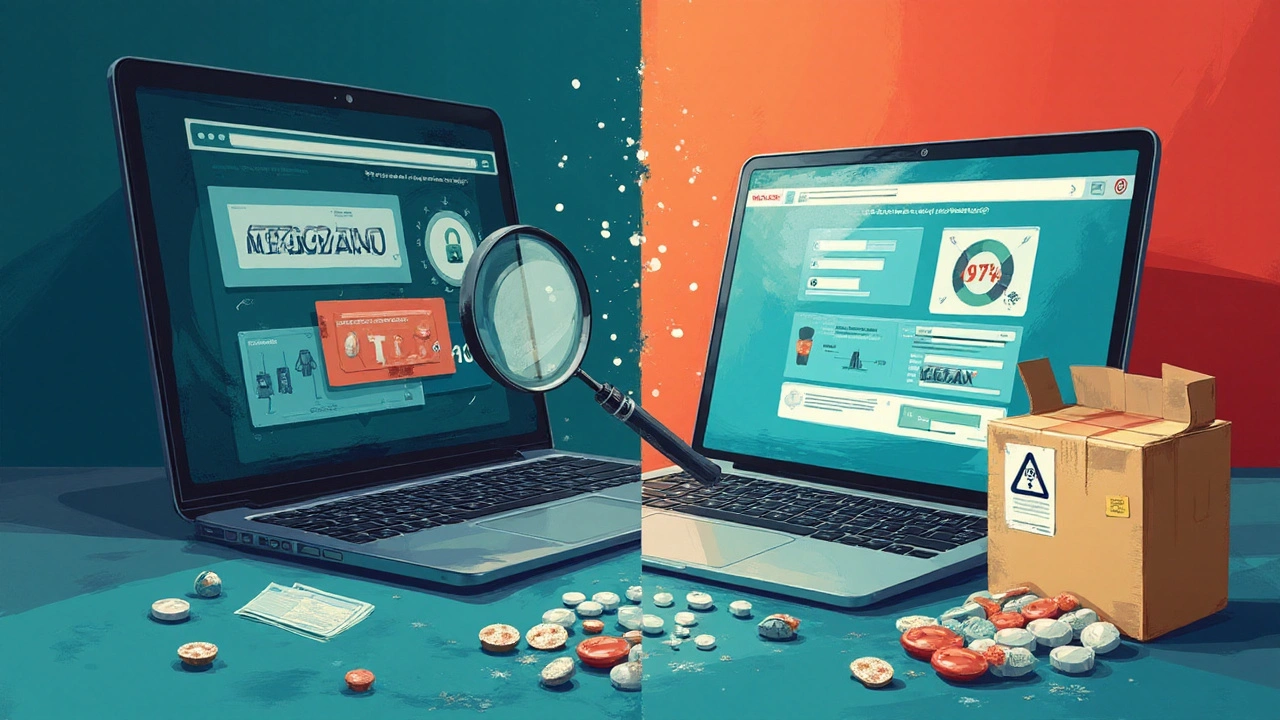You want the same lamotrigine your doctor prescribed, at a price that doesn’t sting, and you want it delivered without drama. That’s doable-but only if you stick to licensed pharmacies, verify the supply, and know where the real savings come from. Expect this to be a straight shot: what’s legal, how to pay less, how to spot fakes, what to check on the label, and a simple plan to order safely. I’ll keep the medical talk practical and the buyer’s advice honest.
What you can legally do to buy lamotrigine online
Yes, you can buy lamotrigine (the active ingredient in Lamictal) online in 2025. But in the United States and most countries, it’s a prescription medicine. That means you need a valid prescription from a licensed clinician, even if you’re ordering from a licensed internet pharmacy. Any website offering it without a prescription is a red flag.
Here’s the fast, safe way to do it:
- Confirm your prescription. If you don’t have one, book a legitimate telehealth visit or talk to your usual clinician. Lamotrigine is used for epilepsy and for maintenance in bipolar I disorder. A quick, honest history is key because dosing depends on your other meds and your diagnosis.
- Choose a licensed online pharmacy. In the U.S., look for National Association of Boards of Pharmacy (NABP) Digital Pharmacy accreditation or a verified .pharmacy domain. Internationally, check the country’s regulator: GPhC in the UK, the EU common logo in Europe, and CIPA in Canada. Sites vetted by programs like LegitScript also add a layer of trust.
- Match what’s on your script. Same drug (lamotrigine), same release type (immediate-release vs. extended-release), same strength (e.g., 25 mg, 100 mg, 150 mg, 200 mg IR; ER strengths vary), and the same directions. If your doctor wrote “Lamictal,” you can usually request a generic substitution unless they marked “dispense as written.”
- Upload the prescription and your details. A real pharmacy will ask for doctor info, your medical history, allergies, and a way to reach your prescriber for verification.
- Expect pharmacist counseling. You should be offered a chance to ask questions about side effects, interactions (valproate, enzyme inducers, hormonal contraceptives), and titration. Licensed teams don’t skip this.
What you should not do:
- Don’t order from sites that ship prescription meds without a prescription or that advertise unreal prices that don’t match the market (think $1 for a month of brand-name Lamictal). Counterfeits are common.
- Don’t import from overseas websites that aren’t licensed. Depending on your country, personal importation may be restricted or illegal. Packages can be seized at customs, and you lose your money.
- Don’t swap strengths to “make it fit” your old directions. Lamotrigine dosing and titration are safety-critical.
Bottom line: you can buy cheap generic lamictal online safely, but only through licensed channels with a valid prescription and proper verification.
Prices and how to pay a lot less (2025)
Good news: generic lamotrigine is one of the more affordable maintenance meds when you use the right price tools. Brand Lamictal, on the other hand, is usually many times more expensive.
Realistic 2025 cash ranges in the U.S. (ballpark, before insurance):
- Generic lamotrigine IR (e.g., 100 mg tablets): often $6-$18 for 30 tablets at big box pharmacies with discount codes; local retail without codes can be $10-$35.
- Generic extended-release (lamotrigine ER): pricier than IR; expect wider ranges, roughly $25-$80 for 30 tablets depending on strength and market fluctuations.
- Brand Lamictal: commonly several hundred dollars per month cash. It’s rarely the cheapest choice unless your prescriber needs brand for a specific reason.
Why the spread? Pharmacies set their own retail prices; distributors change contracts; and coupon networks negotiate different rates. You can still bring costs down with a simple playbook.
Ways to save without cutting corners:
- Price-compare across three channels: cash discount cards (the usual coupon apps), your insurance copay, and pharmacy membership prices. The lowest often wins-no shame in using cash instead of insurance when it’s cheaper.
- Ask for 90-day supplies if your prescriber is comfortable. This often lowers the per-tablet price and reduces refill fees. It also protects you from short-term price spikes.
- Stick with immediate-release unless ER is clinically needed. IR is typically cheaper and widely stocked. If your doctor prescribed ER for a reason (like once-daily dosing consistency), don’t switch on your own.
- Check multiple pharmacies, not just one. Even within the same chain, prices can vary by location. Many online pharmacies let you preview prices after you upload a prescription.
- Ask the pharmacist about therapeutically equivalent manufacturers. If one manufacturer’s lot is backordered or pricey, another AB-rated generic may be in stock at a lower price.
Insurance tips:
- If you have insurance, your cost may be a flat generic copay. Still compare cash prices. Some plans charge more than the public discount price-yes, that happens.
- Apply flexible spending or HSA funds if eligible. It’s real savings if you’re paying cash.
- If you’re on brand Lamictal for a documented reason, ask your prescriber about prior authorization and brand-only coverage. Expect paperwork.
Assistance options if cash is tight:
- Community pharmacy discount programs and local clinic pharmacies often have ultra-low generic rates.
- Manufacturer programs usually focus on brand Lamictal, which may not beat generic pricing, but worth asking if you cannot tolerate any generic.
- Nonprofit patient assistance portals can point you to community resources.
Heuristics that help you pick the best price fast:
- If IR fits your regimen, IR usually wins on price.
- 90-day fills beat 30-day fills on per-tablet cost more often than not.
- Big national chains plus a discount code often land in the lowest quartile. Independents can surprise you-call two and ask.

Spot a legit pharmacy vs. a fake one
Counterfeit risk is not abstract. Lamotrigine is a maintenance drug with serious safety rules; fake or sub-potent tablets can trigger seizures or mood destabilization, and sudden switches in release type can cause adverse effects.
Use this quick checklist before you enter your card number:
- They require a valid prescription and will verify it with your prescriber.
- You see clear licensure: NABP Digital Pharmacy accreditation or .pharmacy domain in the U.S.; GPhC registration (UK); EU common logo (EU/EEA); CIPA membership (Canada). The license displays an ID you can look up on the regulator’s website.
- A physical business name and address are shown and match the license record. A working phone line connects to a real pharmacy team.
- They offer pharmacist counseling and provide the FDA Medication Guide or country-equivalent patient leaflet with each fill.
- Prices are plausible. Deals exist, but they won’t be “too good to be true.” If brand is advertised at generic prices, walk away.
- Secure checkout (HTTPS), transparent privacy policy, and no spammy add-ons for unrelated prescription drugs.
After your order arrives, verify the product before you take it:
- Check the label: your name, drug name (lamotrigine), strength, dosage form (IR vs ER), directions, prescriber, and pharmacy details. Errors here are a deal-breaker.
- Confirm the manufacturer and lot/expiration on the bottle or blister. Real products show consistent branding and imprints.
- Look up the tablet imprint code using a reliable pill identifier or the manufacturer catalog. Imprint, color, and shape should match the stated manufacturer and strength.
- Open the medication guide. For lamotrigine, the guide covers the boxed warning about serious rash and other key risks. If it’s missing, call the pharmacy before using the medication.
Red flags that mean “do not take it”:
- No imprint on tablets that should have one (most U.S. generics do). Blank tablets are suspect.
- Powdery, chipped, or inconsistent tablets, or a chemical odor that’s unusual for lamotrigine. Quality generics are uniform.
- Label says immediate-release, but the pills match an extended-release imprint-or vice versa.
- Pharmacy refuses to answer basic questions about manufacturer or licensure.
If you suspect a problem, stop and call the pharmacy. If they won’t resolve it, report the issue to your country’s regulator (e.g., FDA MedWatch in the U.S.) and contact your prescriber for guidance and a replacement.
Forms, uses, and safety basics you shouldn’t skip
Knowing just enough about the medication helps you order correctly and avoid simple but costly mistakes.
What lamotrigine is for:
- Epilepsy: used alone or with other medicines for certain seizure types.
- Bipolar I disorder: maintenance treatment to help prevent mood episodes. It’s not for acute mania.
Common forms and strengths you’ll see online:
- Immediate-release tablets in multiple strengths; 25 mg, 100 mg, 150 mg, 200 mg are commonly stocked.
- Extended-release (ER) tablets designed for once-daily dosing, available in a range of strengths up to higher doses like 300 mg depending on the manufacturer.
- Some markets offer dispersible/chewable options and orally disintegrating forms; availability varies by country and manufacturer.
Generics vs brand: In the U.S., generics must be AB-rated to Lamictal, meaning they’re bioequivalent within tight FDA limits. Real-world tip: if you’re sensitive to manufacturer switches (some people notice differences), ask the pharmacy to keep you on the same manufacturer each refill. If they must switch, they should tell you in advance.
Safety points you shouldn’t breeze past:
- Boxed warning: serious skin rash, including Stevens-Johnson syndrome, can occur-especially when starting, increasing dose too quickly, or when combined with valproate. New rash? Call your prescriber right away.
- Do not change your dose schedule without medical guidance. Lamotrigine is typically started low and increased slowly for safety.
- Interactions matter. Valproate can raise lamotrigine levels. Enzyme-inducing drugs (like carbamazepine, phenytoin, phenobarbital) can lower levels. Certain hormonal contraceptives may reduce lamotrigine concentrations. Tell your pharmacist everything you take, including over-the-counter meds and supplements.
- Pregnancy and postpartum: levels can fluctuate. Work closely with your prescriber-don’t adjust on your own.
- Missed doses: if you miss several days, don’t just restart where you left off. Call your clinician; a re-titration may be needed.
- Storage: room temperature, dry place. No special cold chain needed, which makes online delivery practical.
Alternatives if lamotrigine isn’t the right fit:
- For mood stabilization: lithium, valproate, certain atypical antipsychotics-each with different monitoring needs and side effect profiles.
- For seizures: options include levetiracetam, oxcarbazepine, topiramate, and others based on seizure type and patient factors.
These aren’t plug-and-play substitutes. Swaps should be clinician-led because tapering and cross-titration strategies differ by drug.
Credible source anchors for your decisions: the FDA-approved Lamictal/lamotrigine prescribing information (for the boxed warning, interactions, and dosage forms), NABP’s Digital Pharmacy accreditation listings (.pharmacy), GPhC register (UK), EU common logo guidance for online pharmacies, and Canadian CIPA membership directories. You don’t need every detail; you just need to know where the guardrails are.

FAQ and next steps
Quick answers to what shoppers usually ask at checkout time:
- Is generic the same as brand? It has to meet bioequivalence standards. Most patients do fine on generic. If you notice a change after a manufacturer switch, call the pharmacy and your prescriber.
- Can I split tablets to save money? Only if your prescriber wrote a plan that allows it and the tablet is scored and immediate-release. Do not split extended-release tablets.
- Why did my price jump this month? Generic markets fluctuate. Check if your pharmacy switched manufacturers, if your discount code changed, or if you moved from a 90-day to 30-day fill.
- Can I return medication I bought online? Pharmacies usually can’t accept returns once the seal is broken, due to safety laws. If there’s a dispensing error or damage, they should replace it.
- What shipping time is normal? Domestic licensed pharmacies often deliver in 2-7 business days. If you’re running low, order a week ahead.
- What if the pill looks different? Manufacturers differ in color and shape. Verify the imprint code. If it doesn’t match, do not take it-call the pharmacy.
- Do I ever need brand-name Lamictal? Occasionally, for patients who’ve had issues with certain generics or for clinical reasons. Your prescriber would specify “dispense as written.” Expect higher cost and prior authorization with insurance.
- Can a telehealth clinic prescribe lamotrigine? Yes, when clinically appropriate and legal in your state or country. Legit clinics perform a real evaluation and follow up on labs/history.
Next steps if you’re ready to order:
- Get your prescription current. Ask your clinician for a 90-day supply with refills if you’re stable.
- Pick two licensed online pharmacies to compare. Confirm accreditations (NABP/.pharmacy in the U.S., your country’s equivalent elsewhere).
- Check prices for your exact product (IR vs ER, strength, quantity) using each site’s cash price and a reputable discount code.
- Upload your prescription, complete the health questionnaire, and verify your address for delivery. Opt in for text or email refill reminders.
- When the package arrives, verify label, imprint, manufacturer, and the medication guide before your first dose from that fill.
Troubleshooting common snags:
- Out of stock: Ask the pharmacy to source the same manufacturer from a partner location, or request a transfer to another licensed pharmacy that has your exact product.
- Insurance rejection: Ask the pharmacist to run a “test claim” with DAW options; if that fails, compare the cash price with a discount card. Sometimes cash beats the copay.
- Price is still high: Switch to a 90-day fill, confirm IR vs ER necessity with your prescriber, or ask for a dose form that’s more common in stock (same total daily dose, prescriber-approved).
- New side effects after a refill: Pause and call your prescriber; ask the pharmacy if the manufacturer changed. You may need a consistent manufacturer or a clinical review.
If you remember one thing, make it this: cheap is great, verified is non-negotiable. Licensed pharmacy, valid prescription, clear product verification-that’s how you get lamotrigine delivered at a fair price without gambling with your health.





Rashi Shetty
August 22, 2025 AT 01:19Stick to licenced pharmacies, that is the whole point, no exceptions. 😊
Verified accreditation and a real pharmacist on the line will save you more grief than any discount code ever will, and that's just a fact.
When price looks absurdly low, assume it's counterfeit until proven otherwise, check imprint codes, manufacturer lot, and the patient leaflet immediately on arrival, and refuse to take anything that doesn't line up.
Buy a 90‑day supply only if your prescriber explicitly approves it, and if you need the same manufacturer, ask the pharmacy to note that on the record so you don't get surprise switches.
Queen Flipcharts
August 25, 2025 AT 01:19National standards matter more than flashy marketing, so always check the pharmacy's regulator credentials first.
Accreditation from the recognized body in your country is the single most reliable trust signal, and insurance paperwork should never replace clinical oversight.
If a telehealth provider prescribes, make sure they documented the titration plan and interaction checks; that legal trace keeps both you and the clinician accountable.
Yojana Geete
August 28, 2025 AT 01:19Do not be casual about titration schedules ever they are not trivial and you cannot skip the slow up‑titration without risking a nasty rash
Also when packages arrive check label and imprint even if you are tired because small differences matter and sometimes pharmacies mix up stock in big chaotic weeks
Keep your prescriber in the loop when you change insurance or pharmacy that way they can flag a re‑titration if needed
Jason Peart
August 31, 2025 AT 01:19I always tell people to treat this like a safety checklist rather than a shopping trip because lamotrigine is a maintenance med and small errors have big consequences.
Verify the script, verify the pharmacy, and verify the pills when they arrive, and repeat that routine every refill, even when you think you know what to expect.
Start low, go slow is not a slogan, it's a clinical imperative that prevents rashes and serious reactions, and it needs to be followed exactly.
If you're switching pharmacies because of price, give your prescriber a heads up so they can write the refill to match the product type and dosing schedule.
Keep a photo record of the pill imprint and the bottle label for every fill because that makes it easier to prove a switch if side effects crop up.
Insurers can sometimes make cheaper choices for you that are clinically reasonable, but they can also force substitutions that you notice, so always compare cash and copay prices before accepting the first option.
90‑day fills usually reduce per‑tablet cost and reduce the administrative churn of monthly refills so they are worth pursuing when clinically safe.
Discount cards and coupon apps are useful but treat them like one of three price checks rather than your only check.
If the pharmacy is cagey about manufacturer details, walk away and use one that provides transparency; you deserve to know who made the pills you take daily.
Do not split ER tablets under any circumstances, and only split scored IR tablets when your prescriber OKs it and the tablet design allows it.
Keep a written log of any new side effects and the date you started a new lot or manufacturer, you will thank yourself if you need to sort out causality later.
Pregnancy, postpartum, and hormonal contraception can change blood levels, so treat those life stages as times to communicate closely with your clinician and to request level checks if indicated.
When a rash appears stop the medication and call the clinician immediately, do not “wait a day” because that day can change outcomes.
Report suspicious products to your regulator so others are protected and the supply chain improves, that's how the system gets better.
Finally, if you ever feel brushed off by a pharmacy or telehealth service, find a new provider because complacency costs lives.
Hanna Sundqvist
September 3, 2025 AT 01:19Sounds legit but trust your gut on shady checkouts
Karen Ballard
September 6, 2025 AT 01:19Quick grammar‑friendly tips for folks ordering online 😊
Always read the medication guide that comes in the package; that document is part of the drug and explains serious risks.
Match the exact dosage form on your prescription to avoid ER/IR mixups and potential dosing errors.
Keep records of pharmacy calls and confirmations; screenshots and dates are surprisingly useful if a dispute arises.
Gina Lola
September 9, 2025 AT 01:19Worth adding some market context - supply chains and contracting shape price swings more than random luck.
Wholesaler contracts, GPO agreements, and manufacturer rebates can nudge one generic manufacturer into the spotlight for a month and then vanish the next month.
When a manufacturer is backordered, pharmacies often pull from secondary suppliers and that can change the pill imprint and the price overnight.
Leah Hawthorne
September 12, 2025 AT 01:19Agree with the supply chain note and wanted to add that pharmacists usually know which manufacturers are stable and can put a hold on a preferred one for you, they just need a clear request.
If you have a history of sensitivity to manufacturer switches tell the pharmacist and the prescriber and document it in the chart, that step helps keep continuity.
Brian Mavigliano
September 15, 2025 AT 01:19Just buy from the cheapest accredited source and move on, drama sells but clarity wins every time.
Brand loyalty in generics is a theatrical affectation, the molecules are regulated and the rest is packaging and marketing.
Too many people fetishize pill color like it's some revelation when the key is the clinical follow‑up, not the hue.
Emily Torbert
September 18, 2025 AT 01:19If you are on lamotrigine offer clear notes to your clinician about any new symptoms after a refill and they will help you sort out whether the issue is clinical or supply‑related
Also keep refill buffers so you don't run out when a pharmacy switches manufacturers or a supply hiccup happens
Queen Flipcharts
September 21, 2025 AT 01:19One more practical note for people in nations with strong regulatory systems: always verify the licence ID on the regulator's site and keep that ID in your records for the pharmacy you use.
That ID is legal proof of legitimacy and is useful if you ever need to report an incident or seek reimbursement.